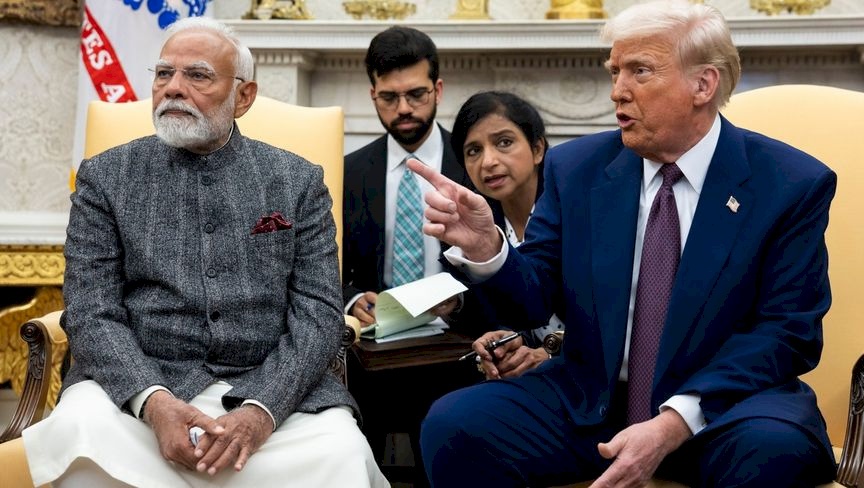
Trump's Tariffs Shock Business and Political Circles in India
SadaNews Economy - As Indian government officials assess their response and business groups calculate the costs of trade barriers, local social media accounts ignited with user protests over Trump’s comments and criticisms of Indian Prime Minister Narendra Modi for not speaking candidly.
The issue began when Trump stated that the trade barriers imposed by India are "the most stringent and annoying" in a post on "Truth Social" on July 30. He added that the United States might also impose sanctions on New Delhi for purchasing weapons and energy from Russia. Less than a day later, he attacked India again for aligning with Russia, labeling them as "dead economies" in another post.
In the absence of an impending trade agreement, a 25% tariff on India took effect on Friday. India is not the only country facing Trump's trade anger — and it's not the one subjected to the highest rates — but the news has left business and political leaders wondering how to deal with its repercussions.
A Candid Message
Akshat Garg, assistant vice president at "Choice Wealth," a Mumbai-based financial services firm, said: "Overnight, the trade equation between the United States and India shifted from tense to turbulent." He added that the tariffs "don’t seem like a well-structured policy as much as they look like a candid political message."
Complicating the discourse surrounding the Indian trade agreement — or rather its absence — was the U.S. agreement with its traditional rival Pakistan, announced on the same day.
With the United States implementing tariffs worldwide on August 1, India’s unfavorable position compared to competing exporting countries became more apparent, dampening morale and sparking further tension.
V. Ilangovan, managing director of "SNQS Internationals," a clothing manufacturing company in Tirupur, a manufacturing hub in southern India, told "Bloomberg News": "The biggest blow was Pakistan and Bangladesh receiving a better tariff rate than us." He added: "We were expecting tariffs between 15% and 20%."
India's discontent is partly attributed to Trump declaring himself a peacemaker who helped mediate a ceasefire in the armed conflict between India and Pakistan in May. This move was seen as an attempt to bypass Modi and place the two neighboring South Asian countries on equal footing despite India's military and economic superiority.
The events of this week have reinforced this impression among some Indian observers.
A Tough Situation for Indian Companies
When news of the tariff rate first broke late Wednesday night in India, Ashish Kanodia recalls feeling "very disturbed." Kanodia works as a manager at "Kanodia Global," a private export company that derives more than 40% of its revenue from the United States from selling home textiles to toys. The entrepreneur already faces two of his largest U.S. clients asking for discounts to offset the tax.
Kanodia said: "The next six months will be tough for everyone," adding that profit margins will shrink. If this situation lasts "for many months," he will have to start reducing his workforce.
The United States is India’s largest trading partner, with bilateral trade between the two countries reaching approximately $129.2 billion in 2024.
In comparison to the 25% tariffs imposed on India, Bangladesh is subjected to a 20% tariff, while Vietnam faces the same rate, and a 19% tariff applies to both Indonesia and Pakistan.
Sabiyachari Ray, executive director of the Gem and Jewelry Export Promotion Council, said: "We are fully aware that we have received a worse deal than other countries... but we will discuss the matter with the government."
A Dramatic Shift in Washington-New Delhi Relations
Trump's actions represent a drastic shift in New Delhi's aspirations for preferential treatment compared to its regional counterparts. India was one of the first countries to embark on trade negotiations with Washington last February, with great confidence in its ability to reach an agreement faster than others.
Trump had referred to Indian Prime Minister Narendra Modi as "my friend" in a post on February 14 on the "X" platform, describing the relationship between the two countries as "special."
In light of the recent escalation, India is currently considering several options to appease the White House, including increasing its imports from the United States, according to "Bloomberg News" sources. Many hope for the possibility of improving bilateral relations and alleviating the intensity of the imposed tariffs.
In this context, Vivek Mishra, deputy director of the Strategic Studies Program at the "Observer Research Foundation" in New Delhi, told "Bloomberg News": "What we are currently witnessing is a storm hitting Indian-American relations, but I believe there is a good chance to overcome it."
Conversely, Indian business and trade groups continue to support the government’s position during ongoing negotiations over the anticipated trade agreement with the United States.
Negotiation Tactic or Political Outburst?
Ray stated that jewelry companies are "concerned but not in a state of panic," hoping for a more favorable deal. He added: "Negotiations should be based on the principle of mutual benefit, not a scenario where one side wins and the other loses."
For his part, Rohit Kumar, co-founder of "The Quantum Hub" for public policy research, described Trump’s unexpected announcement via social media during ongoing negotiations with India as "appearing to be an emotional reaction."
Kumar added: "This escalation seems like a negotiation tactic targeting unresolved points in the discussions."

"European Central Bank" Keeps Interest Rates Unchanged for the Fifth Consecutive Time

Oil Prices Decline After Tehran Confirms Its Intent to Hold Negotiations with Washington

"Human Rights Watch": Israel and Washington Killed Hundreds of Civilians in Yemen in 2025

Qatar Strengthens Its Presence in the Asian Gas Market with Long-Term Agreement with Malay...

UAE Private Sector Growth Reaches Highest Level in 11 Months Boosted by Sales Momentum

Saudi Arabia and Turkey Expand Cooperation in Energy and Explore New Opportunities

Oil prices continue to rise following escalating tensions between Washington and Tehran an...
